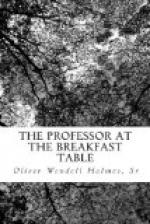The second thing would be to depolarize every fixed religious idea in the mind by changing the word which stands for it.
—I don’t know what you mean by “depolarizing” an idea,—said the divinity-student.
I will tell you,—I said.—–When a given symbol which represents a thought has lain for a certain length of time in the mind, it undergoes a change like that which rest in a certain position gives to iron. It becomes magnetic in its relations,—it is traversed by strange forces which did not belong to it. The word, and consequently the idea it represents, is polarized.
The religious currency of mankind, in thought, in speech, and in print, consists entirely of polarized words. Borrow one of these from another language and religion, and you will find it leaves all its magnetism behind it. Take that famous word, O’m, of the Hindoo mythology. Even a priest cannot pronounce it without sin; and a holy Pundit would shut his ears and run away from you in horror, if you should say it aloud. What do you care for O’m? If you wanted to get the Pundit to look at his religion fairly, you must first depolarize this and all similar words for him. The argument for and against new translations of the Bible really turns on this. Skepticism is afraid to trust its truths in depolarized words, and so cries out against a new translation. I think, myself, if every idea our Book contains could be shelled out of its old symbol and put into a new, clean, unmagnetic word, we should have some chance of reading it as philosophers, or wisdom-lovers, ought to read it,—which we do not and cannot now any more than a Hindoo can read the “Gayatri” as a fair man and lover of truth should do. When society has once fairly dissolved the New Testament, which it never has done yet, it will perhaps crystallize it over again in new forms of language.
I did n’t know you was a settled minister over this parish,—said the young fellow near me.
A sermon by a lay-preacher may be worth listening—I replied, calmly. —It gives the parallax of thought and feeling as they appear to the observers from two very different points of view. If you wish to get the distance of a heavenly body, you know that you must take two observations from remote points of the earth’s orbit,—in midsummer and midwinter, for instance. To get the parallax of heavenly truths, you must take an observation from the position of the laity as well as of the clergy. Teachers and students of theology get a certain look, certain conventional tones of voice, a clerical gait, a professional neckcloth, and habits of mind as professional as their externals. They are scholarly men and read Bacon, and know well enough what the “idols of the tribe” are. Of course they have their false gods, as all men that follow one exclusive calling are prone to do.—The clergy have played the part of the flywheel in our modern civilization. They have never suffered it to stop. They have




